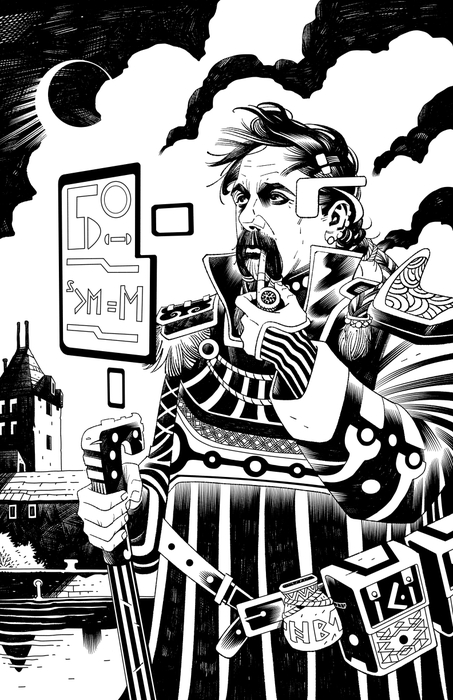we (viking) ship Earl Rognvald & Queen Ermingerd.
After completing the Orkneyinga Saga: The History of the Earls of Orkney, we couldn't help but notice that at Earl Rögnvald Kali Kolsson's stop in Narbonne how he composes court-like but still Heathen-like battle imagistic poetry to celebrate their Queen Ermingerd's beauty. In verse Rögnvald declares his adoration of her, and of the personal attention that she gives him as a guest in her realm.
And even far after Rögnvald insists on leaving to complete his Mediterranean adventure, despite Ermingerd's courtiers strongly suggesting he marry her, he and the more poetically disposed of his men still continue to sing of her worth, hoping that she will hear these tales of their deeds as they head eastwards, and in their words she becomes a paragon of beauty that inspires their actions, an unforgettable ideal.
Yet it's never explained why Earl Rognvald doesn't return to southern coastal France and reconnect with his favoured Queen (well, technically a Viscountess). There's geography to consider as he and his men disembark in Puglia, Italy, on the heel of the boot, to instead make a stop at Rome, then ride on horseback northward all the way back to Orkney. This puts Narbonne at least an extra 100 miles out of the way, given that they're taking a direct line to northwest Denmark. History also has it that Ermingerd (Ermengarde) married twice in her life, so perhaps between Rögnvald's visit and his long trip back (about 2.5 years during 1151-53 CE), the Queen may have been obliged by political circumstances to take another as her first husband, and Rögnvald might have heard of this by the time he rode into northern Italy. It also could be their individual or mutual sense of duty: She has Narbonne to consider as he has Orkney to tend, and should they marry one must forsake their country. All that's NorsePlay's speculation on why their reunion doesn't happen.
Still, as we read, we hoped that one of them would decide to visit the other later in the saga, but it isn't mentioned. We wonder if the skalds of Orkney did recite an untold story of their reunion that has been lost, or that sometimes tales would get codas of reunions in the afterworlds, when concerns like duty or distance can finally be set aside and love won. We'd like to think so.
And even far after Rögnvald insists on leaving to complete his Mediterranean adventure, despite Ermingerd's courtiers strongly suggesting he marry her, he and the more poetically disposed of his men still continue to sing of her worth, hoping that she will hear these tales of their deeds as they head eastwards, and in their words she becomes a paragon of beauty that inspires their actions, an unforgettable ideal.
Yet it's never explained why Earl Rognvald doesn't return to southern coastal France and reconnect with his favoured Queen (well, technically a Viscountess). There's geography to consider as he and his men disembark in Puglia, Italy, on the heel of the boot, to instead make a stop at Rome, then ride on horseback northward all the way back to Orkney. This puts Narbonne at least an extra 100 miles out of the way, given that they're taking a direct line to northwest Denmark. History also has it that Ermingerd (Ermengarde) married twice in her life, so perhaps between Rögnvald's visit and his long trip back (about 2.5 years during 1151-53 CE), the Queen may have been obliged by political circumstances to take another as her first husband, and Rögnvald might have heard of this by the time he rode into northern Italy. It also could be their individual or mutual sense of duty: She has Narbonne to consider as he has Orkney to tend, and should they marry one must forsake their country. All that's NorsePlay's speculation on why their reunion doesn't happen.
 |
| [There are no historical renderings of Ermingerd, so we've selected Vikings' Rollo & French Princess Gisla from the History Channel show to NorsePlay as this saga's stunt doubles.] |
Still, as we read, we hoped that one of them would decide to visit the other later in the saga, but it isn't mentioned. We wonder if the skalds of Orkney did recite an untold story of their reunion that has been lost, or that sometimes tales would get codas of reunions in the afterworlds, when concerns like duty or distance can finally be set aside and love won. We'd like to think so.
# # #
Guillermo Maytorena IV knew there was something special in the Norse Lore when he picked up a copy of the d'Aulaires' Norse Gods and Giants at age seven. Since then he's been fascinated by the truthful potency of Norse Mythology, passionately read & studied, embraced Ásatrú, launched the Map of Midgard project, and spearheaded the neologism/brand NorsePlay. If you have employment/opportunities in investigative mythology, field research, or product development to offer, do contact him.




Comments
Post a Comment